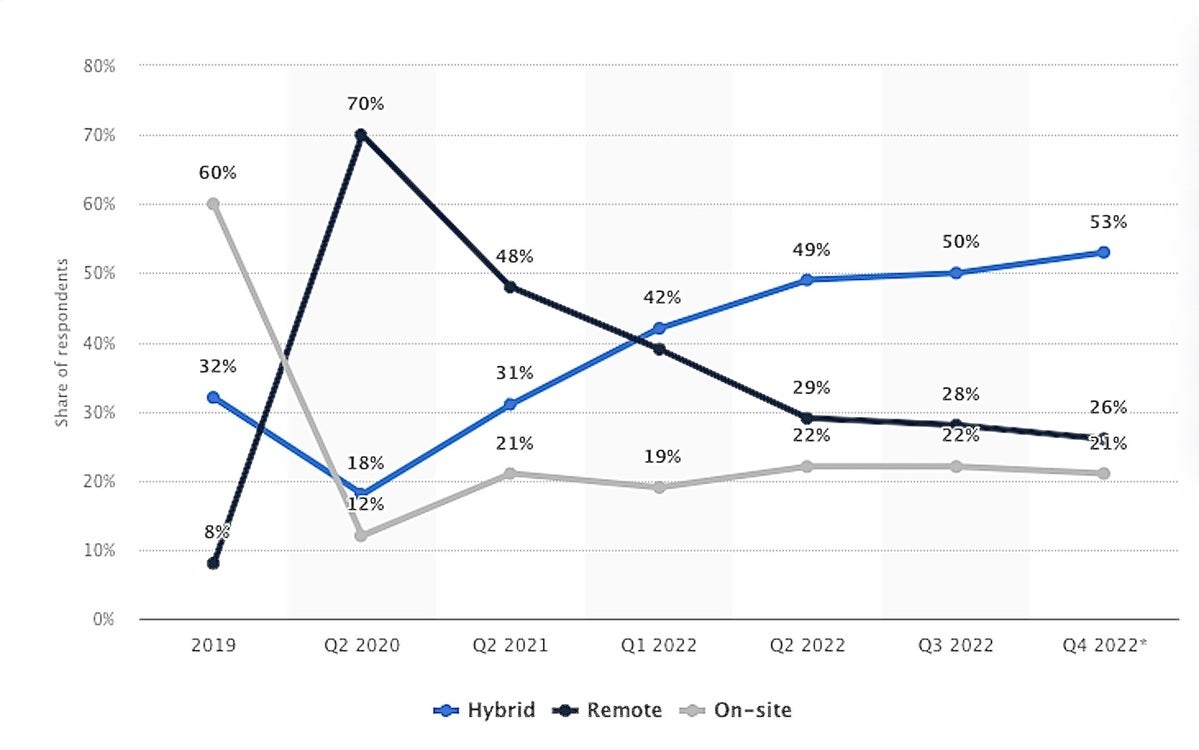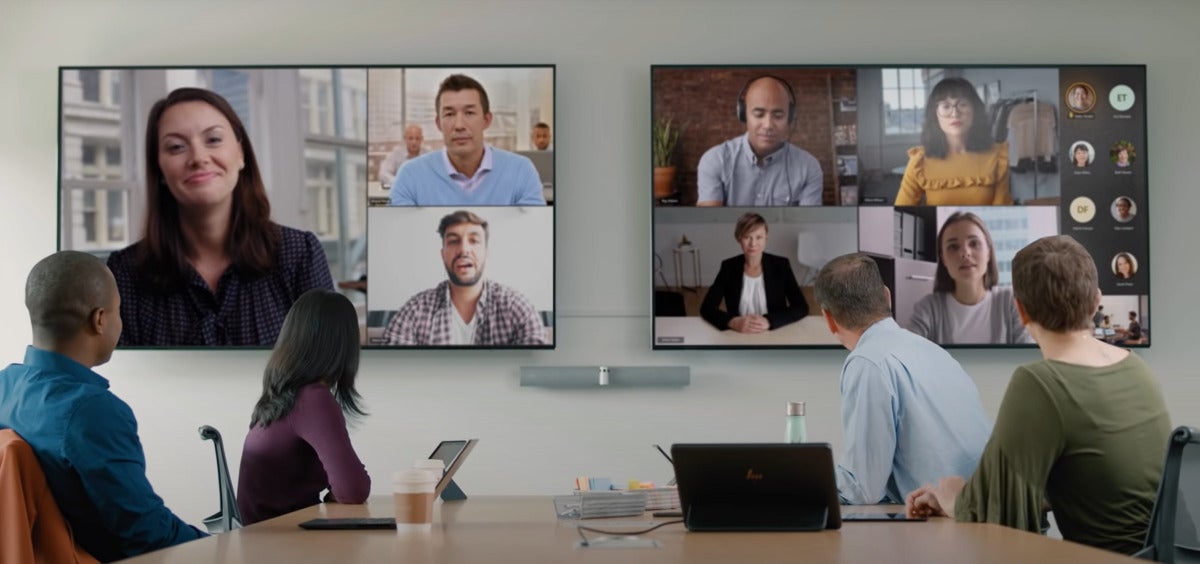As companies settle into the reality that hybrid and remote work will dominate tech and other 'knowledge worker' industries for the foreseeable future, the next challenge is to create corporate cultures that drive results.
In Q4 2022, 79% of US employees worked in a remote or hybrid environment, according to market data firm Statista. Only 21% were fully onsite, compared with 60% fully onsite in 2019.
 Statista
StatistaThe "Computer & IT" industry was the top career category for fully remote jobs in 2022, with remote listings growing 24% year over year, according to job search site FlexJobs.
Remote work is reshaping industries, allowing for greater employee work-life balance and flexibility while also enabling companies to consider a geographically borderless pool of talent. At the same time, companies are struggling with how to keep employees engaged as a team in a corporate vision and culture.
With the US unemployment rate dropping to 3.5% last month (just 1.8% in the tech sector), organizations are struggling to recruit top talent even as many companies lay off workers hired in haste during the COVID-19 pandemic. So it's also key to ensure that the recruiting, interviewing, and onboarding process for new employees is conducive to long-term retention.
 Jessica Kriegel
Jessica Kriegel
Jessica Kriegel, chief scientist of workplace culture at Culture Partners
Jessica Kriegel, PhD, the chief scientist of workplace culture at business consultancy Culture Partners, spoke with Computerworld about what business leaders need to do to create a workplace culture — even one that's based on a remote or hybrid model — that’s not only profitable but engages employees, keeping them productive, creative, and happy.
The following are excerpts from that interview:
What are some best practices organizations can use to ensure they not only find the right talent, but also create the best possible interview and onboarding experience? "I think the most [successful] companies understand this is like dating. People interview with multiple companies, and companies interview multiple candidates. So, both parties need to be excited about it, but many managers come from a place of entitlement or privilege where they believe everyone wants the job and they’ve got it to dole out.
"So, first it’s about changing the mentality of the hiring manager so that they don’t think of it as a competition. It’s much more of a sales opportunity to recruit someone to your company. You are selling the culture of the organization.
"What you don’t want is to fall into the trap of being insincere or inauthentic about your brand or culture, because then what happens... is ultimately the employee learns it's not what they were promised, and they end up leaving shortly after being hired. That attrition can be very disruptive to business practices.
"If we want people to be more innovative, they need to have the belief that leadership encourages risk-taking and embraces failure in an effort to be more innovative."
"The other thing is finding ways to have the interview be much more about understanding [a prospect's] abilities to apply their skills to what the job will entail, rather than just being a personality check. Most interviews are treated like, 'Do I like this person?' That’s dangerous because that’s looking for culture fit. And culture fit is extremely dangerous to organizations.
"Most hiring managers think, 'Do I like this person, or would I want to get a beer with them?' In that case, you end up hiring people who look like you... and talk like you. That’s unconscious bias. You’re going to prevent the organization from having diversity of thought and demographics.
"What’s more powerful is purpose fit — understanding what the individual’s purpose is, and if they don’t know what that is, helping them understand what it is. In other words, what motivates them and what meaning do they want to have in their vocation Then ensure there’s alignment with the organization’s purposes. Because if there is, that employee is going to work 10 times harder and be 10 times more passionate."
How do you create workplace culture in a time of hybrid and remote work? "Most people think about culture in terms of perks. They think about ping-pong tables and Hawaiian-shirt Fridays, which theoretically are supposed to make people happier. Leaders who are trying to make their employees feel better are failing to leverage culture to drive results, because they don’t understand culture. Culture is not about feelings. Culture is about the feelings we share that shape our beliefs. Our beliefs are what drive our actions, and our actions is what gets us results.
"So, to get different results in an organization, you need to ask yourself, 'What actions do we need our employees to take?' Then ask, 'What beliefs would they need to hold?' And then we can be intentional about creating experiences that will lead to those beliefs.
"For example, if we want people to be more innovative, they need to have the belief that leadership encourages risk-taking and embraces failure in an effort to be more innovative. So, the experience leaders need to create for that belief is not chastising and punishing people who fail fast. Recognizing and telling stories about people who were innovative — how they tried, tried, and tried. And how they failed, failed, and failed until they succeeded.
"Really, you should be selling all your office space and donating it to developers to make homes for the homeless or something, and be intentional about getting together every once in a while and not a certain number of days a week."
"A ping-pong table isn’t going to make anyone more productive. A Hawaiian shirt day isn’t going to make anyone more innovative. And having a happy hour on Thursday isn’t going to create organizational collaboration. That’s just going to make people temporarily happy."
What are some tips? When should companies require knowledge workers to be in-office and for what reasons? "I think the office needs to be thought of differently — no longer a space to work but now a space to gather with intentionality. So, going back to the definition of culture, which is experiences shaping beliefs that drive action, which get results. Bringing people together in person is an experience that should be created in order to shape a belief.
"Don't try to get people into the office just to have them there because you think it will magically produce more creativity or productivity. The belief shaped in that experience is that you want to make sure I’m sitting at my desk: 'They don’t trust I’m doing my work. They don’t care about my health or happiness,' because all the studies show when we work from home we’re more productive, happier, and healthier.
"So that’s actually going to have the opposite effect on the employee’s beliefs to get the actions out of them than if you just be intentional about being in the office. That looks like: 'Let’s get together once a year in the office or some hotel retreat.'
"Really, you should be selling all your office space and donating it to developers to make homes for the homeless or something, and be intentional about getting together every once in a while and not a certain number of days a week."
A lot of companies are dropping college degree requirements for new hires, even for technology or knowledge worker positions. Instead, they’re hunting for people who have a passion for technology and a willingness to learn. Is that a strategy that’s working out? "Removing degree requirements is the best thing that’s happened to the workforce in a long time in terms of diversity, equity, and inclusion. Degree requirements are arbitrary. They often seem like a necessary prerequisite for a job, but in reality they have nothing to do with a person’s ability to actually do the job. Most jobs in corporate America don’t benefit from an employee having a degree.
"So, these organizations that remove degree requirements remove the privilege white people have in the workforce, because the percent of whites who have degrees is higher than the percentage of Blacks and Hispanics who have degrees. So, it’s creating more opportunity and access for the people who have been disadvantaged in the area of education."






